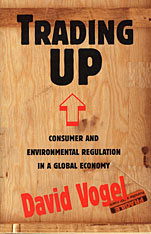
Despite America's pluralistic, fragmented, and generally adversarial political culture, participants in pollution control politics have begun to collaborate to reduce the high costs of developing, implementing, and enforcing regulations. Edward P. Weber uses examples from this traditionally combative policy arena to propose a new model for regulation, "pluralism by the rules," a structured collaborative format that can achieve more effective results at lower costs than typically come from antagonistic approaches.
Weber cites the complexity and high implementation costs of environmental policy as strong but insufficient incentives for collaboration. He shows that cooperation becomes possible when opposing sides agree to follow specific rules that include formal binding agreements about enforcement, commitment to the process by political and bureaucratic leaders, and the ensured access and accountability of all parties involved. Such rules establish trust, create assurances that agreements will be enforced, and reduce the perceived risks of collaboration. Through case studies dealing with acid rain, reformulated gasoline, and oil refinery pollution control, Weber demonstrates the potential of collaboration for realizing a cleaner environment, lower compliance costs, and more effective enforcement.
Challenging the prevailing view that endless conflict in policymaking is inevitable, Pluralism by the Rules establishes a theoretical framework for restructuring the regulatory process.


Health, safety, and environmental regulations have been traditionally perceived as distinct entities from trade policy, yet today they have become intertwined on a global scale. In this pioneering work, David Vogel integrates environmental, consumer, and trade policy, and explicitly challenges the conventional wisdom that trade liberalization and agreements to promote free trade invariably undermine national health, safety, and environmental standards. Vogel demonstrates that liberal trade policies often produce precisely the opposite effect: that of strengthening regulatory standards.
The most comprehensive account of trade and regulation on a global scale, this book analyzes the regulatory dimensions of all major international and regional trade agreements and treaties, including GATT, NAFTA, the Free Trade Agreement between Canada and the United States, and the treaties that created the European Community and Union. He explores in depth some of the most important trade and regulatory conflicts, including the GATT tuna-dolphin dispute, the EC's beef hormone ban, the Danish bottle case, and the debate in the United States over the regulatory implications of both NAFTA and GATT.
This timely book unravels the increasingly important and contentious relationship between trade and environmental, health, and safety standards, paying particular attention to the politics that underlie trade and regulatory linkages. Trading Up is essential reading for the business community, policymakers, environmentalists, consumer interest groups, political scientists, lawyers, and economists.
READERS
Browse our collection.
PUBLISHERS
See BiblioVault's publisher services.
STUDENT SERVICES
Files for college accessibility offices.
UChicago Accessibility Resources
home | accessibility | search | about | contact us
BiblioVault ® 2001 - 2024
The University of Chicago Press









